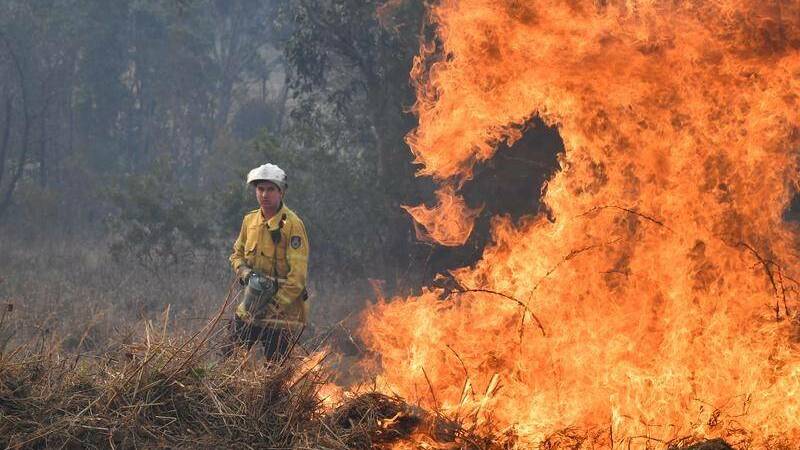
The fire season starts at the end of this month, and the region's fire brigades are helping locals to prepare for summer.
Subscribe now for unlimited access.
$0/
(min cost $0)
or signup to continue reading
Every year, the NSW Rural Fire Service holds a Get Ready Weekend on September 19 and 20 - described as an opportunity to engage with your local brigade, find out about the bush fire risk in your area, and to plan and prepare for the coming bush fire season.
"It is really designed so that people will go home with a change in their behaviour," RFS safety community officer Inspector David Stimson said. "We hope that they will now accept that there is a risk where they live, and that they need to do something to mitigate that personal risk to them and their property."
Many brigades run fire station events or discuss fire plans with residents. They open their doors to the public; invite the local community in to meet the firefighters and look at the equipment; and host a sausage sizzle, Inspector Stimson explained. Most importantly, crews can speak to the brigade about what they should do leading up to the high peak of the fire season.
For information about events near you, visit http://www.rfs.nsw.gov.au/news-and-media/getready.
The Canyonleigh RFS will hold a community training day on Saturday, September 12, in their Fire Shed from 9am to 4pm.
"We invite a limited number of residents to come and hear about fires, what they do, and we actually give them experience on how to put out spot fires with water and without," brigade secretary Terry Biscoe said.
The day will provide information on fire behaviour, understanding human nature in times of crisis, how to prepare mentally and physically, property preparation, bush fire survival plans, and understanding the fire danger rating. Places are limited; call Frances on 0417 262 564 to book.
Canyonleigh residents can also talk to the brigade about their fire plans and fire safety at the Get Ready Weekend on September 19 and 20.
The Hill Top RFS will be open on September 19 from 10am to 2pm.Crew members also open the station doors every Saturday morning for anyone from the community to come in and ask questions or just have a cuppa, senior deputy captain Michelle Coates said.
"We have never been overwhelmed with community participation," Ms Coates said; "this year might be different, but our thoughts are even if you to speak one person only, then that's a success."
This year, however, COVID restrictions are causing issues with face-to-face meetings and station openings, Inspector Stimson said. Many brigades have decided not to open, because controlling the influx of people coming throughout the day and keeping them within COVID guidelines is difficult. Instead, many brigades have moved their Get Ready Day online, using Facebook or websites.
"Some are innovative and informative at the same time, and most of them are inviting any questions that people might have or advice they are seeking," Inspector Stimson said. "They are adapting and overcoming to make sure they can give very important messages and advice to our communities."
The Wingello RFB are running a virtual Get Ready month since mid-August, providing information and suggestions for the public to start preparing their property.
The Burrawang Rural Fire Brigade are particularly smart, Inspector Stimson said; they have launched a new website (https://burrawangrfb.org/), with a four-week challenge to Get Ready before bushfire season.
"At the end of the day, all our volunteers are doing the best they possibly can for their individual communities," Inspector Stimson said.
The public can visit the RFS' MyFirePlan website (https://www.myfireplan.com.au/ ). "It runs you through a questionnaire which tells you where you're at threat, and what you can do to improve your property coming up to the fire season," Wingello RFB community engagement officer Steph said.
Mr Biscoe's advice was simple: "Don't light fires!" He recommended that the public follow the RFS on social media (Facebook: https://www.facebook.com/nswrfs and Twitter: https://twitter.com/NSWRFS) .
"It's basically a case of be aware, be careful, and be prepared."
- To report a fire, ring triple zero (000) immediately.
- Bush Fire Information Line: 1800 679 737 (NSW RFS)
- Fires Near Me: https://www.rfs.nsw.gov.au/fire-information/fires-near-me


